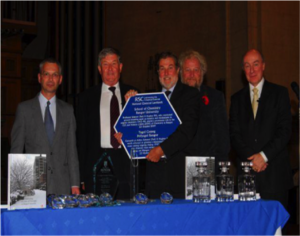As part of the 125 year celebrations of chemistry at Bangor University and following the prestigious lecture by Sir John Meurig Thomas, Vice Chancellor, Professor Merfyn Jones, received a RSC chemical landmark plaque on behalf of the School of Chemistry from Professor David Phillips, RSC President-Elect. The award is in recognition of the major contribution to the development of kinetics and mechanisms in organic chemistry by Prof Edward (Ted) D Hughes and the continuous 125 years of chemistry at Bangor, now one of the oldest schools of chemistry in the UK. Dr Malcolm Jones, Bangor Council member, gave a talk about the achievements of Ted Hughes to a packed audience of invited guests, staff and students past and present.
 From left to right
From left to right
Dr Mike Beckett Head of School of Chemistry,
Prof David Phillips RSC President-Elect, Vice-Chancellor
Prof Merfyn Jones
Prof Chris Adams
and
Dr Malcolm Jones.
Prof Ted Hughes was a trailblazer in kinetics and mechanisms in organic chemistry. As a researcher in the period, 1928-63, Hughes’ work changed the aspect of organic chemistry by progressively replacing empiricism by rationality and understanding. Hughes was a long time colleague and friend of Sir Christopher Ingold, equally recognised for this area.
Hughes and Ingold introduced the mechanism terminology of Sn1, Sn2, E1 and E2 to organic chemistry in the mid 30’s and behind this was a multitude of carefully planned reactions, a talent that Hughes possessed. The understanding that Hughes and often, but not always, Ingold developed on substitution and elimination will be core to every first/second year university chemistry course across the world.
Hughes, son of a farmer, was born near Criccieth, in Gwynedd, close to where David Lloyd George was brought up. His first language was Welsh and was educated at Llanstumdwy Elementary and Porthmadog County Schools. He graduated with a 1st Class Honours in Chemistry at UCNW, Bangor and obtained his Ph.D. also from Bangor in 1930 with Ingold as the external examiner. During this period, under the Leadership of Prof K Orton, Bangor was one of the finest centres of physical chemistry in the world.
Hughes joined Ingold’s new group at University College, London (UCL) where he stayed until 1943 when he was appointed to the Chair of Chemistry at Bangor. He developed an active research programme at Bangor and the best known work during this period was the development of a method for isolating isotopically enriched water from natural water by continuous fractional distillation. This technique yielded 18-O enriched water that could be used to trace the fate of particular O atoms in a substrate molecule undergoing reaction and thereby elucidating the mechanism of the reaction. It is believed that this was the first time 18-O had been separated by distillation in the UK and would have opened the door to enormous advances in Chemistry, Biology and Nuclear Physics.
During his tenure at Bangor, Hughes maintained his collaboration with Ingold by his appointment as Honorary Research Associate at UCL. In 1948, Hughes moved back to UCL to a Chair in Chemistry where he remained until his death in 1963, aged 57. He was elected a Fellow of the Royal Society in 1949.
While Hughes was dedicated to Chemistry, he had a love of breeding and racing greyhounds. When he died, he left a wife, a daughter and 57 greyhounds.
Ted Hughes will be remembered as one of Wales’ most eminent and productive chemists.

